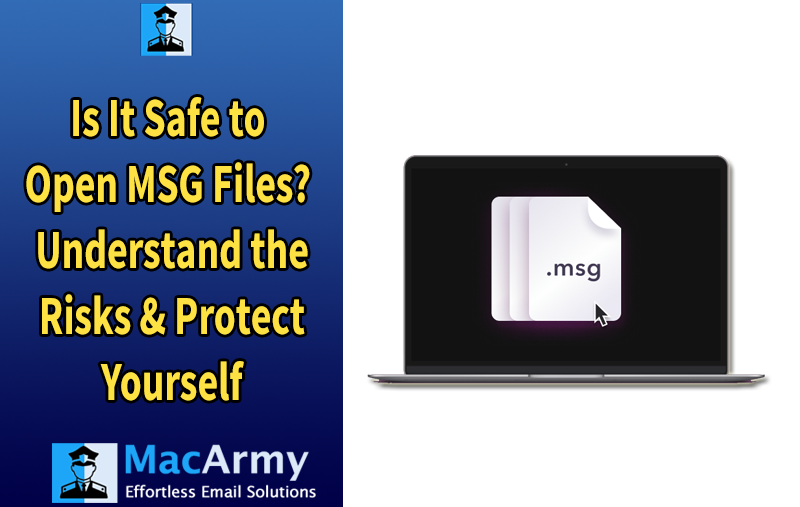Is It Safe to Open MSG Files? Understand the Risks & Protect Yourself

Overview: Received a file ending in .msg and wondering whether it’s safe to open? You’re not the only one. MSG files are generally used by Microsoft Outlook to store individual email messages. While they serve a legitimate purpose, they can also be exploited to deliver harmful content such as malware or phishing links.
In this blog, we’ll break down what MSG files are, explore the potential risks associated with them, and provide best practices for opening them safely.
What is an MSG File?
Ever come across a file with the .msg extension and wondered what it is? Simply put, it’s a saved email message from Microsoft Outlook. These files store the full content of an individual email, including:
- The subject line
- Sender and recipient details
- Date and time the email was sent
- The message body
- Any attached files
MSG files are created when you save an email from Outlook to your computer. They make it easy to store or share specific messages without needing to forward them through Outlook.
Are MSG Files Safe or Harmful?
On their own, MSG files are not dangerous. They’re standard Outlook email files used to store message data. However, the real risk depends on the contents of the file.
When Are MSG Files Safe to Open?
MSG files are usually safe when:
- They come from a sender you know and trust.
- You open them using Microsoft Outlook without issues or error messages.
- The message includes only basic content such as plain text or standard HTML without any suspicious links or unexpected attachments.
When Can MSG Files Be Risky?
You should be cautious if:
- The file was sent by an unknown or suspicious source.
- The email content seems like spam or includes phishing links.
- The MSG file contains potentially harmful attachments, like executable files (.exe), compressed files (.zip), or documents with macros.
Is It Safe to Open MSG Files in Microsoft Outlook?
Generally, opening MSG files in Microsoft Outlook is safe provided the file comes from a reliable and trusted sender.
Why Opening MSG Files in Outlook is Usually Secure
- Outlook is specifically designed to open and manage MSG files, as it is the program that creates them.
- The application has built-in security measures that filter out potentially harmful content, such as malicious scripts or dangerous links.
- Attachments within MSG files are sandboxed, meaning they won’t execute automatically and will only open if you choose to open them manually.
When You Should Be Cautious
- If the MSG file originates from an unfamiliar or suspicious email address.
- If it contains unexpected attachments like .exe, .bat, .js, or .docm files, which are commonly used to spread malware.
- When the email message contains urgent language or suspicious links, often indicating phishing attempts.
How Risky Is It to Open Attachments in MSG Files?
Opening attachments within MSG files can be risky, especially if the file comes from an unknown or suspicious sender. Although MSG files are commonly used to save Outlook email messages, they can also carry dangerous elements such as malicious attachments, phishing links, or embedded scripts. Cybercriminals often exploit MSG files to bypass security filters and trick users into executing harmful content.
Main Risks to Be Aware Of
- Malicious Attachments: Files like .exe, .docm, or script files hidden inside MSG attachments can install malware on your device.
- Phishing Threats: Some MSG files may contain deceptive emails or links that lead to phishing websites.
- Hidden Scripts: Embedded scripts or HTML exploits might take advantage of vulnerabilities in Outlook.
- Security Evasion: In some cases, nested MSG files can slip past antivirus programs, making them harder to detect.
Safety Tips
Always scan MSG files and their attachments with reliable antivirus software before opening them. If possible, extract attachments separately and avoid opening any file if you’re unsure about its origin. Taking these precautions will help keep your system secure.
How to Determine If MSG Files Are Safe or Dangerous
If you receive an MSG file and are uncertain about its safety, it’s crucial to carefully examine it before interacting with any attachments or links. While most MSG files are harmless, some may contain malicious content designed to deceive you. Opening these files without caution can put your computer and sensitive information at risk. Always verify the sender and scan files to stay protected.
How to Safely Open and Read MSG Files
Use a Free Viewing Tool
Instead of opening MSG files directly in Outlook, consider using a free MSG file viewer like MacArmy’s MSG Viewer. This tool allows you to preview the contents without activating any potentially harmful elements such as hidden scripts or dangerous links. Using a dedicated viewer helps you avoid accidentally triggering malicious content.
Try a Professional Automated Solution
The MacArmy MSG Converter Tool offers a safe way to convert MSG files into secure formats such as PDF or TXT, all without requiring Outlook. Viewing your emails in these non-interactive formats minimizes the risk of exposure to malware or malicious code.
By using these secure readers or converters, you can safely transform MSG files into over 25 formats, including PST, PDF, IMAP, DOC, EML, MBOX, Gmail, and more allowing you to examine messages safely without risking your system’s security.
Conclusion
While MSG files themselves aren’t inherently dangerous, they can become a serious threat if they contain malicious attachments, phishing links, or hidden scripts. To safeguard your data, avoid opening MSG files directly especially those from unknown or suspicious sources. Instead, use the tools discussed in this article to safely view and convert messages files into non-interactive formats, reducing the chance of encountering harmful content. Following these precautions will help you manage messages files securely and protect your system from potential risks.
